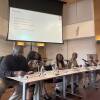Months after Baltimore Orioles outfielder Adam Jones said he was peppered with racial slurs by one or more Boston Red Sox fans at Fenway Park, local sports radio hosts and their listeners are still debating if the incident occurred at all.
Meanwhile, representatives of African-American community groups and Boston Red Sox officials have been meeting to address the state of race relations at Fenway. Among the requests made by members of the group purporting to represent black communities in the area are for more resources for kids of color. But the issues facing the Red Sox may be far more complex than what can be solved by free tickets and good will.
Six years ago, when I stood near the batters’ mound at Harambee Park in Dorchester for a story about race and baseball, the field was packed with kids. Recently, however, less than a dozen boys and girls stood in the outfield to catch fly balls.
John Gordon has been coaching Dorchester-Roxbury Little League Baseball for 23 years. He says there’s no guarantee that kids will stay in the game, and even less of a guarantee that they will succeed in this and other Boston neighborhoods marked by disproportionately greater poverty, gangs and violence. But Gordon said the Red Sox could do more to promote baseball in communities of color.

“They know the interest is not in the African-American community," Gordon said. "They know it. They know it’s not.”
When asked whether he'd say the Red Sox have given up, Gordon said, "I would say so." He says there was a time when the Red Sox relationship to this community was more robust, and more of his kids were treated with trips to Fenway.
“Years ago, they used to reach out to us. They used to offer equipment and offer us to start leagues under the Red Sox Foundation, things of that sort," he said. "But it hasn’t happened recently, cause every year we used to see 20 or 30 or 40 tickets they used to send down to get the kids interested to go to Fenway. We really haven’t seen too much anymore.”
Responding to Gordon, Boston Red Sox President Sam Kennedy said, “first of all there should be access to every kid in Boston and in New England that wants to go to Fenway Park.”
Kennedy grew up in the South End and regularly attended games at Fenway as a kid, thanks to discounted tickets. Defending the Red Sox organization, Kennedy said the team has made Fenway Park more accessible over the years by charging less than the price of a movie.
“For every game, for all 81 games, at our ticket office on the day of the game, we affirmatively hold back seats — $9 tickets for people to come to Fenway. We have to get that word out cause Fenway has to be accessible," Kennedy said. "Those are the ways that we’re going to get kids to fall in love with baseball: access and participation.”
But at Harambee Park, the baseball field was almost bare compared to the adjacent basketball court and lacrosse field, which were packed with young people.
Willey Cunningham, wearing a baseball hat that showed the tatters of age, sighed thinking about the challenges of the game today. He is a 55-year-old assistant coach for Dorchester-Roxbury Little League who grew up playing baseball in Franklin Field near Blue Hill Avenue. Cunningham said what the Red Sox do, or don’t do, cannot necessarily reignite passion for baseball among distracted black youth.
“I just think the culture today, I think what it is, is the game is slow. These kids don’t have the patience for this kind of game," he said "You can’t appreciate someone who throws a no-hitter cause if you’re in the field, you’re bored.”
But Robert Lewis, executive director of the Dorchester youth sports and academic organization, THE BASE, said inner-city baseball can be great again, and he credits the Red Sox in part.
“We’re growing. We’ve been fortunate enough to raise resources, money and support with companies like Franklin, New Balance and others," said Lewis, whose recent experiences with baseball recruitment contrast greatly with John Gordon's. "We’ve had more black and Latino kids not just go to games. Our kids are on the field. Over the years we’ve met Pedro, Big Papi and others. So, we’ve been provided all those opportunities to access that we wouldn’t have been able to get if the Red Sox not only didn’t give us tickets, but gave us access to being on the field.”
Lewis said the Red Sox shouldn’t be held responsible for cultural shifts. He advises Dorchester-Roxbury Little League to join with The BASE and other local groups to help revitalize baseball in communities of color, which is competing for attention with basketball, football, and now lacrosse.
At Harambee field, coach John Gordon nodded his head in agreement. Gordon, who once worked for the Red Sox rookie team, is encouraging his 11 year-old son Ajani Jayden Gordon, who was warming up to pitch, to pursue a career in the sport. Ajani Jayden Gordon believes that Fenway and baseball are a lot friendlier to him today than they were to his father in the 1980s.
“No bad things have been happening so far. I think baseball does accept me as a young man," Ajani Jayden Gordon said.

And Ajani says he feels comfortable at Fenway Park, which has not always been true for many people of color. Robert Lewis of THE BASE wants other people of color to be just as comfortable both attending Fenway and playing the game.
One thing is for sure: The greatest pastime in this country is baseball. And as John Gordon and his son Ajani Jayden Gordon prove, it is still the sport that gets passed down from a father to a son, no matter the color of their skin.





